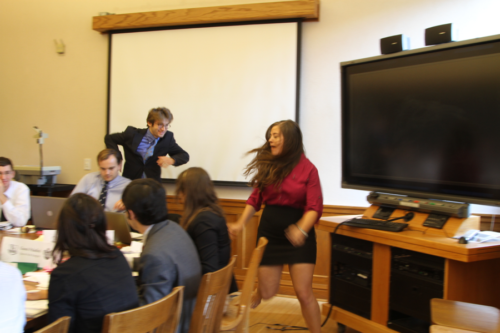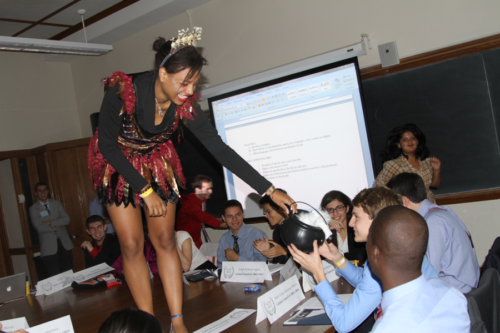Brian Kitano is a rising sophomore at Yale University, a Committee Director for the Failed States Crisis committee at the Security Council Simulation at Yale (SCSY) 2016 and an Under Secretary General for YMUN 2017.
Edits and additions made by Arvin Anoop, a rising junior at Yale University and Secretary General of the Security Council Simulation at Yale (SCSY).
Recall the traumatic childhood experience of being force fed cauliflower at dinner. “Here comes the choo-choo train!” mom warns us overzealously, and here, squirming, panicking at the table, we hermetically seal our lips to fend off the onslaught of vegetables. We shut out what mom knows is good for us. Unfortunately, we the chairs and Under Secretaries-General (USGs) of Model UN, are mom in this metaphor. We try too hard to force our delegate toddlers to eat what they don’t think is tasty, what is in fact rather dry and tasteless and unpalatable, though nutritious and necessary. I’m of course referring to genuine political and ideological debate, which is what creates fiery committees, passionate delegates, and rooms where the hours feel like minutes because everything is so stimulating and engaging. It is hard to draw delegates to bite into the veggie casserole that is good committee. Complex political issues therefore need to be masked under a thick layer of cheese and breadcrumbs. Maybe even chocolate sauce. Steamed vegetables, while tasty for us chairs, need to be woven into a storyline, an issue that can be touched, felt, and demands thoughtful inquiry. Wait, did I just mix metaphors?

Unexpected fast-paced action is critical to the fantasy committee game
Essentially, our obligation to delegates is to craft (Kraft?) imaginative, flexible topics that are outlets for political ideology, without them realizing it. Outlets where delegates splatter the table with their core beliefs on human rights, economics, and governance, without them knowing that these discussions are really about abstract, obtuse questions that actual politicians deal with on a daily basis. If politicians are eating salad, then we need to serve our delegates pasta sauce that has been heavily and tastefully seasoned (carefully and thoughtfully written), so that they don’t know the food is also packed with tomatoes, onions, and whatever other veggies we can sneak in.
In the same sense, by choosing a topic like The Hunger Games State Collapse (my genius committee) at the Security Council Simulation at Yale (SCSY) this year, we can naturally incorporate discussions about national sovereignty, the rule of law during war, the bounds of civilian participation in combat, and the ethical treatment of refugees, all under the guise of fan-fic. It is hard to ask a group of high-schoolers to defend their core beliefs to a group of strangers, in the same way we don’t ask children to eat vegetables without some serious coaxing and seasoning. It’s bland, it’s tasteless, and no one enjoys digesting these big ideas for the sake of digesting big ideas. Instead, we as chairs and USGs need to present fully cooked, thoughtfully constructed crises that are recipes for fierce debate, that urge delegates to confront these questions for themselves, and respond to the multitude of perspectives coming from the rest of the dinner table.
In this way, under the guise of whatever our topic may be, we cultivate a MUN feast that is rife with philosophical dilemmas, political disagreements, and unsettled questions for the future. Our duty as chairs is to teach kids to enjoy eating vegetables, and guide them towards the parts of their palates that they have until this point either been unexposed to or afraid to taste. By hiding hard questions in easy-to-swallow topics, we can open up a whole new pantry of brain food for budding intellectuals (thought foodies?) like us.
All in all, there is a deeper value and (vanilla?) essence to often underestimated fantasy committees. The fantasy committee’s flavor may be unimpressive and ridiculous at first – something like a Hunger Games committee masked as a Failed States crisis. But the idea is to do quite the opposite – mask the Failed States crisis as a Hunger Games committee. Chairs need to make a deliberate effort to explore the wider analogies and real world parallels fantasy committees can create for Model UN conferences. And given how fun they are, fantasy committees have the special ability and privilege of getting delegates to think about questions and address challenges while they take on roles of characters they love and hate so much. Fantasy committees are the best food for thought.

Magical things can happen in fantasy committees

